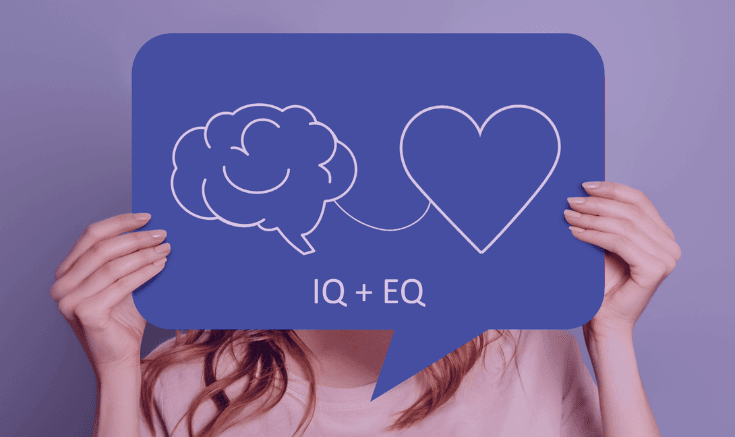

EQ vs IQ: Which matters more in the workplace?
FEB. 7, 2025
5 Min Read
Success in the workplace depends on more than intelligence alone.
While cognitive intelligence shapes analytical thinking and technical skills, emotional intelligence influences communication, teamwork, and leadership effectiveness. A strong balance between both enhances workplace relationships, improves productivity, and supports long-term professional growth. Recognizing how these two forms of intelligence interact helps individuals refine their approach to problem-solving, conflict resolution, and leadership development. Understanding the distinct roles of emotional quotient (EQ) and intelligence quotient (IQ) provides a strategic advantage in fostering collaboration and improving workplace performance.
Key Takeaways
- 1. Emotional intelligence influences communication, teamwork, and leadership, while cognitive intelligence strengthens problem-solving and technical skills.
- 2. Strong EQ improves workplace relationships by enhancing empathy, trust, and collaboration, making it essential for leadership success.
- 3. IQ supports logical reasoning, structured problem-solving, and technical expertise, contributing to efficiency in analytical and operational roles.
- 4. A balanced approach between EQ and IQ leads to better leadership, stronger workplace engagement, and improved productivity.
- 5. Developing both forms of intelligence helps professionals adapt to challenges, refine interpersonal skills, and achieve long-term success.
What is emotional intelligence?

Emotional intelligence refers to recognizing, understanding, and regulating emotions in yourself and others. It affects how people interact, handle stress, and build relationships. The concept became widely recognized after psychologist Daniel Goleman highlighted its significance in professional and personal success. Strong emotional intelligence supports effective communication, conflict resolution, and leadership skills, making it an important factor in workplace performance. Research indicates that individuals with high emotional intelligence are better equipped to handle pressure, maintain motivation, and foster positive workplace relationships.
"Individuals with strong emotional intelligence can navigate workplace relationships, resolve conflicts efficiently, and foster a collaborative environment."
Understanding emotions and responding appropriately can improve collaboration and reduce misunderstandings. Employees who interpret social cues and regulate responses tend to create a more cooperative work environment. Emotional intelligence is particularly valuable in leadership roles, where the ability to empathize with others and communicate influences team productivity. High emotional intelligence strengthens professional relationships, leading to better teamwork and a more engaged workforce.
What is emotional quotient?

An emotional quotient (EQ) measures an individual’s ability to understand, regulate, and influence emotions. This concept extends beyond personal awareness to include how emotions shape interactions with others. Unlike intelligence quotient (IQ), which evaluates logical reasoning and problem-solving, EQ focuses on emotional awareness, impulse control, and relationship management. Studies suggest that emotional competence is critical to workplace success, influencing collaboration, leadership effectiveness, and resilience under pressure.
EQ consists of several key components: self-awareness, self-regulation, motivation, empathy, and social skills. High EQ allows individuals to recognize emotional cues, adjust responses based on the situation, and communicate effectively. Strong interpersonal awareness can improve productivity by reducing miscommunication, enhancing teamwork, and preventing unnecessary conflicts. People with higher EQ are more likely to stay composed in stressful situations and approach challenges with a balanced mindset.
Workplaces benefit significantly from employees with strong EQ, particularly in leadership and client-facing roles. Professionals who can interpret emotional signals and adjust their approach accordingly contribute to a more cooperative and engaged workforce. Effective collaboration depends not only on technical knowledge but also on emotional adaptability. Teams prioritizing emotional awareness tend to operate more efficiently, resolve conflicts faster, and maintain long-term working relationships that drive sustained results.
How to measure EQ and IQ?
Assessing emotional quotient (EQ) and intelligence quotient (IQ) provides insight into an individual’s cognitive abilities and emotional awareness. While IQ tests evaluate problem-solving skills, logical reasoning, and analytical thinking, EQ assessments measure self-awareness, empathy, and social interactions. Understanding these two distinct forms of intelligence helps businesses identify potential leaders, improve team dynamics, and enhance overall productivity.

- Standardized IQ tests: Cognitive ability is typically assessed through structured tests that measure logical reasoning, mathematical skills, verbal comprehension, and spatial awareness. Some of the most widely used IQ tests include the Wechsler Adult Intelligence Scale (WAIS) and the Stanford-Binet Intelligence Scale. These evaluations provide a quantifiable measure of intellectual capacity.
- Emotional intelligence assessments: Unlike IQ tests, EQ assessments focus on emotional regulation, empathy, and social interactions. Popular tools such as the Mayer-Salovey-Caruso Emotional Intelligence Test (MSCEIT) and the Emotional Intelligence Appraisal measure an individual’s ability to recognize and manage emotions. These tests often use situational judgment scenarios to gauge emotional responses.
- Behavioral observations: Emotional intelligence can be evaluated through real interactions and responses to social situations. Managers and colleagues may provide feedback on an individual’s ability to handle conflict, communicate effectively, and support team members. Observing behavioral patterns over time offers valuable insight into emotional competence.
- 360-degree feedback: Organizations often use multi-source input from peers, supervisors, and subordinates to assess EQ in workplace settings. These assessments provide a broader perspective on an individual’s communication skills, adaptability, and leadership potential. Unlike self-reported tests, 360-degree feedback minimizes bias and highlights areas for growth.
- Self-report questionnaires: Various self-assessment tools, such as the Trait Emotional Intelligence Questionnaire (TEIQue), allow individuals to reflect on their emotional strengths and weaknesses. While these tests provide valuable insights, they may be influenced by personal perception rather than objective measurement.
- Neuroscientific approaches: Advances in brain imaging and physiological testing have introduced new methods for evaluating cognitive and emotional intelligence. Functional MRI (fMRI) scans and electroencephalograms (EEGs) can measure brain activity related to problem-solving, emotional regulation, and management processes. These techniques are typically used in research settings rather than everyday assessments.
Measuring EQ and IQ provides a comprehensive understanding of an individual's strengths and areas for improvement. While IQ remains an important factor in technical and analytical roles, EQ plays a major role in leadership, teamwork, and workplace relationships. Organizations that assess both types of intelligence can create more effective teams, improve collaboration, and maximize business outcomes.
Key differences between EQ and IQ in the workplace

The main difference between EQ and IQ in the workplace is how they influence performance and relationships. IQ reflects problem-solving ability, logical reasoning, and analytical thinking, while EQ determines how well individuals manage emotions, communicate, and collaborate with others. Both play a role in workplace success, but EQ often significantly impacts leadership, teamwork, and adaptability.
| Factor | EQ (Emotional quotient) | IQ (Intelligence quotient) |
|---|---|---|
| Definition | Measures emotional awareness, self-regulation, empathy, and interpersonal skills. | Measures cognitive ability, logical reasoning, problem-solving, and analytical thinking. |
| Impact on workplace success | Influences teamwork, leadership, and conflict resolution. | Determines technical competence and problem-solving efficiency. |
| Role in leadership | Helps leaders build trust, communicate effectively, and manage teams. | Contributes to strategic thinking and technical expertise. |
| Effect on teamwork | Enhances collaboration by improving communication and emotional understanding. | Supports task execution by strengthening analytical skills and logical thinking. |
| Evaluation style | Based on emotional awareness, adaptability, and social perception. | Focused on data analysis, reasoning, and factual evaluation. |
| Handling stress and pressure | Helps manage stress through emotional regulation and resilience. | Provides problem-solving skills but may not address emotional responses to stress. |
| Conflict resolution | Encourages empathy, negotiation, and de-escalation of workplace disputes. | Uses logic to assess issues but may lack emotional sensitivity. |
EQ and IQ contribute to workplace success, but emotional intelligence often plays a greater role in leadership and interpersonal interactions. Professionals with strong EQ can communicate effectively, manage stress, and resolve conflicts more efficiently. Technical expertise and analytical ability remain essential, but collaboration and workplace relationships may suffer without emotional awareness. Finding a balance between cognitive intelligence and emotional competence leads to stronger teams, improved communication, and better overall business outcomes.
Emotional intelligence vs cognitive intelligence
Emotional intelligence and cognitive intelligence contribute to workplace performance but influence professional success in distinct ways. Emotional intelligence focuses on recognizing, managing, and responding to emotions, while cognitive intelligence centers on logical reasoning, memory, and analytical thinking. Both play a significant role in leadership, collaboration, and problem-solving, but they serve different functions in professional settings. Understanding the strengths and applications of each provides insight into how individuals communicate, adapt, and perform in workplace settings.
| Aspect | Emotional intelligence | Cognitive intelligence |
|---|---|---|
| Primary focus | Understanding emotions, managing relationships, and adapting to social situations. | Processing complex information, solving problems, and applying logical reasoning. |
| Application in leadership | Strengthens communication, builds trust, and enhances team motivation. | Supports strategic thinking and complex problem-solving in structured processes. |
| Interpersonal impact | Improves collaboration, conflict resolution, and emotional awareness in workplace interactions. | Enhances analytical discussions, structured planning, and knowledge-sharing. |
| Response to pressure | Regulates emotions, manages stress, and maintains composure in challenging situations. | Strengthens logical reasoning under pressure but may not address emotional resilience. |
| Workplace influence | Contributes to teamwork, employee engagement, and adaptability in professional settings. | Supports technical expertise, data interpretation, and structured problem-solving. |
Balancing emotional intelligence and cognitive intelligence strengthens workplace performance by combining emotional awareness with logical reasoning. Professionals with strong emotional intelligence foster collaboration, build meaningful workplace relationships and manage stress effectively. Cognitive intelligence supports technical expertise, critical thinking, and structured analysis, helping individuals solve problems with clarity and precision. Both contribute to leadership effectiveness, with emotional intelligence enhancing interpersonal skills and cognitive intelligence reinforcing structured problem-solving.
Can you improve your EQ and IQ?
"A combination of EQ and IQ leads to well-rounded professional growth. Logical reasoning supports technical expertise and analytical governance, while emotional intelligence strengthens teamwork, conflict resolution, and leadership effectiveness."
Strengthening both EQ and IQ provides long-term benefits in leadership, communication, and problem-solving. While IQ is often considered a stable trait, cognitive abilities can be refined through continuous learning, analytical exercises, and exposure to complex challenges. Expanding knowledge in technical fields, engaging in strategic thinking, and refining problem-solving techniques contribute to intellectual growth. Mental exercises such as logical puzzles, reading comprehension, and structured discussions challenge the brain, helping professionals process information more efficiently and apply knowledge effectively in workplace scenarios.
Emotional intelligence develops through self-awareness, social interactions, and intentional behavioral adjustments. Recognizing emotional triggers, reflecting on responses, and refining communication skills improve emotional regulation and interpersonal relationships. Practicing empathy strengthens professional interactions, allowing individuals to interpret emotions, adapt to different personalities, and build trust within teams. Emotional resilience plays a major role in leadership, influencing how professionals handle stress, engage with colleagues, and manage workplace challenges. Developing these skills improves adaptability and fosters stronger collaboration.
A combination of EQ and IQ leads to well-rounded professional growth. Logical reasoning supports technical expertise and analytical governance, while emotional intelligence strengthens teamwork, conflict resolution, and leadership effectiveness. A professional with high cognitive ability but low EQ may struggle with collaboration, while someone with strong emotional awareness but limited analytical skills may face challenges in complex problem-solving. Strengthening both creates a balanced approach that improves overall performance, fosters workplace harmony, and supports long-term success in leadership roles.
How can leaders balance EQ and IQ?

Strong leadership requires a combination of emotional quotient and intelligence quotient to guide teams effectively, solve complex problems, and maintain a productive work environment. Cognitive intelligence strengthens analytical thinking, strategic planning, and technical expertise, while emotional intelligence allows leaders to manage relationships, communicate effectively, and foster team engagement. Self-awareness plays a significant role in balancing these skills, helping leaders regulate their emotions, stay objective under pressure, and respond thoughtfully to challenges. Emotional intelligence helps leaders interpret nonverbal cues, adjust communication styles, and create a workplace culture that prioritizes collaboration and trust.
An effective leader applies cognitive intelligence to solve operational and technical challenges while using emotional awareness to motivate teams and resolve conflicts. Relying solely on analytical skills may overlook employee morale, while leadership based only on emotional awareness can lack structure in problem-solving. A balanced approach helps leaders connect with employees on a human level while maintaining logical evaluation that supports business objectives. Prioritizing both EQ and IQ strengthens communication, builds trust, and improves overall workplace efficiency, allowing teams to operate with clarity and purpose.
Emotional intelligence and cognitive intelligence each play an essential role in shaping workplace success. A balanced approach helps leaders strengthen collaboration, improve productivity, and drive meaningful results. At Lumenalta, we guide organizations through effective leadership strategies that align emotional awareness with analytical expertise. Let’s build stronger teams, foster better communication, and create a brighter path forward.
Table of contents
Common questions about EQ and IQ
What is the biggest difference between EQ and IQ in the workplace?
Can EQ be more important than IQ in leadership?
How can employees improve their EQ at work?
Do high-IQ individuals always perform better in the workplace?
What are the best ways to assess EQ in professional settings?
Want to learn how EQ and IQ can bring more transparency and trust to your operations?






